BEIJING (ANN/CHINA DAILY) – With artificial intelligence (AI) at the forefront of technological advancements, Chinese internet companies are intensifying their search for skilled professionals to lead in this transformative field. The domestic job market is evolving rapidly in response, raising the bar for job seekers, industry experts reported.
A recent report by Peking University’s National School of Development and job portal Zhaopin highlighted that AI-related job openings surged significantly in the first half of the year. Positions related to natural language processing increased by 111 per cent year-on-year, while deep learning roles rose by 61 per cent, with the average monthly salary for these roles around CNY24,000 (USD3,370).

Hu Jiayin, an associate professor at the National School of Development, noted that AI roles come with higher entry requirements. “AI-related positions, especially those in natural language processing and deep learning, demand advanced education and extensive experience. For job seekers aiming to enter the AI field, higher degrees and richer work experience are becoming essential,” she said.
The emergence of large language models, such as ChatGPT by US-based OpenAI, has already disrupted certain job sectors, including clerical and customer service roles, according to Zhaopin’s data. The report urged job seekers to continually upgrade their skill sets to stay competitive in an AI-driven market.
The World Bank also acknowledged the impact of AI on employment, especially in East Asia and the Pacific. “Displacement is beginning in routine cognitive roles and gradually affecting nonroutine cognitive jobs,” the report said, noting that China and Malaysia may benefit from AI due to a relatively high share of nonroutine cognitive roles.
Xu Yifan, a postgraduate student at Shanghai University of Engineering Science, expressed optimism about his career prospects in AI. Focusing on federated learning—a tool crucial for data security—he views AI as a force reshaping society and the economy. “In such a dynamic field, ongoing learning is essential,” he said, adding that adaptability will be key to staying competitive.
Li Qiang, Zhaopin’s vice-president, emphasized that flexibility and continuous learning are crucial for a career aligned with AI advancements. “It’s important for individuals to integrate AI knowledge with their current professions and to develop skills that complement AI, such as teamwork and effective communication,” he advised.
Hu from Peking University added that no job seeker can afford to ignore AI’s influence. For employees at all levels, learning to use AI tools and enhancing soft skills like innovation and communication will be essential as AI continues to reshape the workforce.



















































